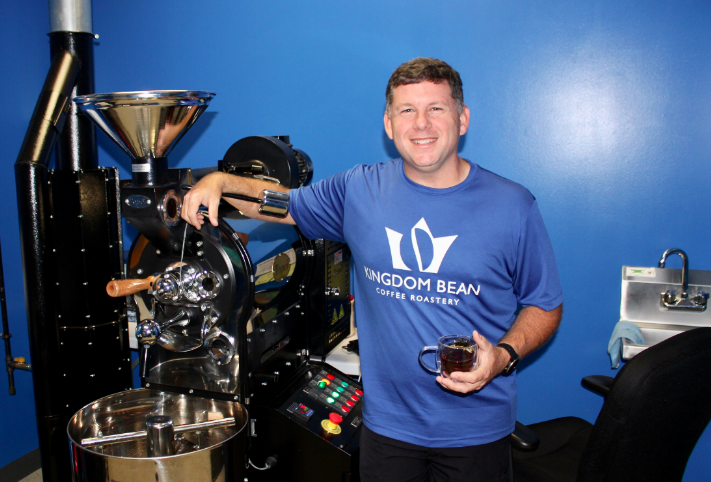Kingdom Bean Coffee Helps People Around the World
Photography Provided
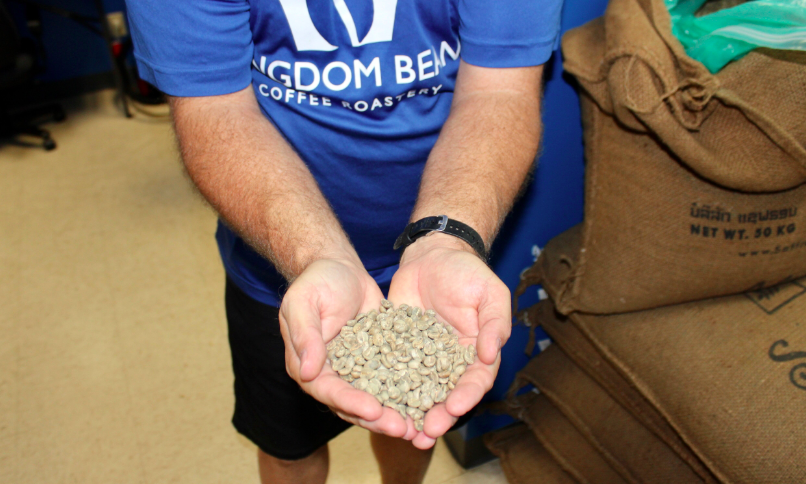 When David Dale first moved to Southeast Asia 15 years ago, he didn’t know he would find his life’s calling, but that’s exactly what happened. He initially worked for an agriculture company that promoted soybeans. Over time, however, he learned all about the farming community and the plight that upland farmers faced. Unlike the wealthier farmers who planted rice, soybeans and other crops in the lowlands, upland farmers plant their crops on the mountainside. Crops grow during the rainy season but due to heavy erosion, the land is not sustainable and the soil is degraded quickly, which means they have to clear new plots the following year.
When David Dale first moved to Southeast Asia 15 years ago, he didn’t know he would find his life’s calling, but that’s exactly what happened. He initially worked for an agriculture company that promoted soybeans. Over time, however, he learned all about the farming community and the plight that upland farmers faced. Unlike the wealthier farmers who planted rice, soybeans and other crops in the lowlands, upland farmers plant their crops on the mountainside. Crops grow during the rainy season but due to heavy erosion, the land is not sustainable and the soil is degraded quickly, which means they have to clear new plots the following year.
“Basically, upland farmers have to do four times as much work for less than half the yield,” explains Dale, who wanted to find a way to help those farmers.
He began to think of an agricultural cash crop he could promote that would make sense to plant in the mountains rather than in the lowlands.
“It had to be something that would fetch a high enough price on the market that would make it worth our while as well as worth the while of the farmers to plant and sell it to us,” Dale says.
It also needed to be something that he could export to a larger stable international market.
“I didn’t want to do some fad thing,” he says. “I wanted something stable.”
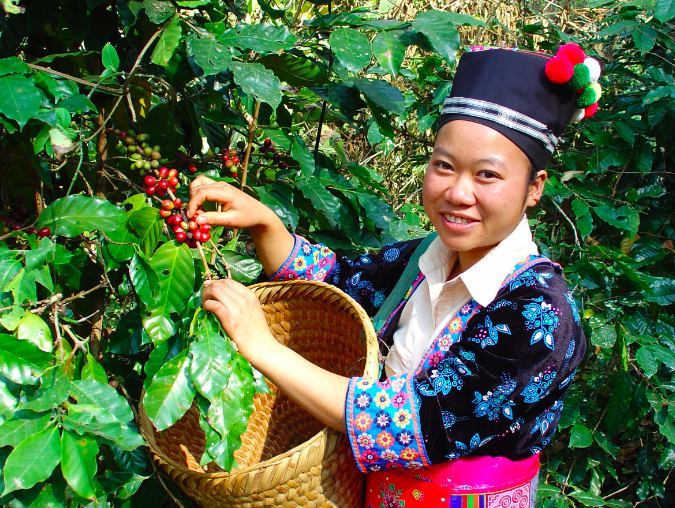 Someone suggested coffee and as Dale researched the climate and terrain in northern Laos, the product checked all the boxes for a sustainable cash crop. Ironically, at the time he wasn’t even a coffee drinker. He found one village where a development agency had promoted coffee cultivation but never helped connect them to markets so although the coffee grew just fine, they couldn’t sell it.
Someone suggested coffee and as Dale researched the climate and terrain in northern Laos, the product checked all the boxes for a sustainable cash crop. Ironically, at the time he wasn’t even a coffee drinker. He found one village where a development agency had promoted coffee cultivation but never helped connect them to markets so although the coffee grew just fine, they couldn’t sell it.
“We came along and that was the piece of the puzzle that was missing,” Dale says. “Not only could we provide them with the crop and technological expertise to successfully cultivate, plant and harvest that crop, but we could also provide them with the market to sell it.”
By growing coffee, these upland farmers could have an income that was at least quadruple what they were getting from upland rice or corn. Luang Prabang is the name of the city and province where Dale started the coffee company, so he jokes that he “put the bang in Luang Prabang!”
The other interesting part of this story is that these farmers in northern Luang Prabang used to grow opium. Back in the day, Laos was known as one of the countries in the Golden Triangle (the area where the borders of Thailand, Burma, and Laos come together) and was the leading region from where opium was sourced. The mountainsides were covered in opium poppy. Then in the early 2000s, Laos joined the international community and the government carried out a program to eliminate poppy cultivation. Opium plots were cut down, but the farmers were never given sustainable cash crops.
“That kind of poverty led these upland peoples to all sorts of problems, including sickness and human trafficking of young girls,” says Dale, who knew that by increasing people’s economic situation, vulnerability to human trafficking would be alleviated. He set out to do that with coffee.
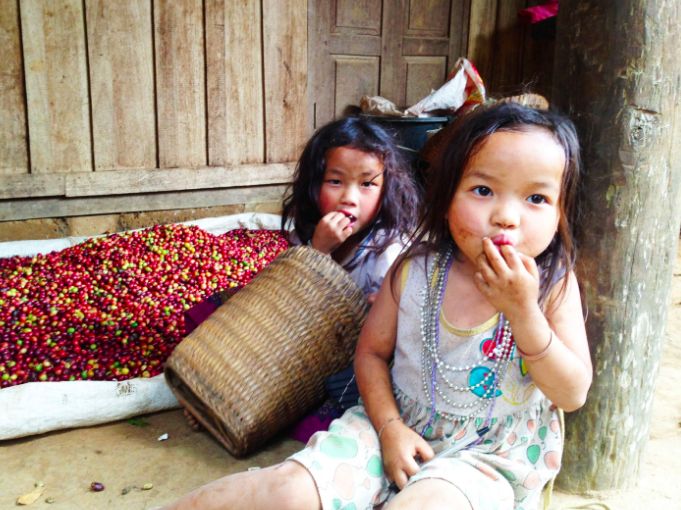 Dale admits that his plan did not go smoothly at first. For one thing, he and his Lao employees were seen as outsiders to the upland farmers. They didn’t trust the suggestion of planting this new crop. Dale understood their apprehension. After all, coffee wasn’t an established crop or livelihood in northern Laos.
Dale admits that his plan did not go smoothly at first. For one thing, he and his Lao employees were seen as outsiders to the upland farmers. They didn’t trust the suggestion of planting this new crop. Dale understood their apprehension. After all, coffee wasn’t an established crop or livelihood in northern Laos.
“People who are in poverty are very risk adverse because they can’t afford to take a chance and fail,” Dale says. “It was difficult to get them to try something they had never done before.”
Ultimately, Dale made believers out of everybody, and in the end, prior to moving to Louisville in 2016, he promoted coffee cultivation to more than 800 families and 20 different villages in the province of Luang Prabang.
“It wasn’t a silver bullet,” Dale says. “It takes time, but it can definitely help the farmers to begin the climb out of poverty.”
When Dale and his wife, Tou, and their children Elijah, Hannah and Jonah left Laos, they didn’t shut everything down (they had opened two coffee shops in Laos while there).
“We were involved with coffee production all the way from planting the seeds and growing the trees through harvest processing, roasting and then with our coffee shops actually grinding, brewing and serving cups of coffee and espresso,” Dale says.
According to Dale, Luang Prabang is the number one tourist destination in the country of Laos because it is a UNESCO World Heritage Site.
“A half a million tourists go through there every year,” Dale says. “That’s one way our coffee shop is able to help — because we sell to expatriate communities as well as tourists.”
Last year, Dale opened Kingdom Bean Coffee in Louisville. He roasts in Jeffersontown but sources it from his own company in Laos as well as China, Sumatra, Thailand, Vietnam, Ethiopia and Brazil — places around the world that also use coffee as a vehicle for helping disadvantaged people. It was important to him to open the coffee shop because he wanted to support the efforts of companies that use coffee to help disadvantaged people, which is why he sources from such social & sustainable enterprises. He also wanted to give others the opportunity to do so by purchasing their beans.
“Our plan is to give a portion of our profits to mission work in Southeast Asia,” Dale says. “I also want to use this business to have a local impact, too, and to use it to share the love of God with people.”
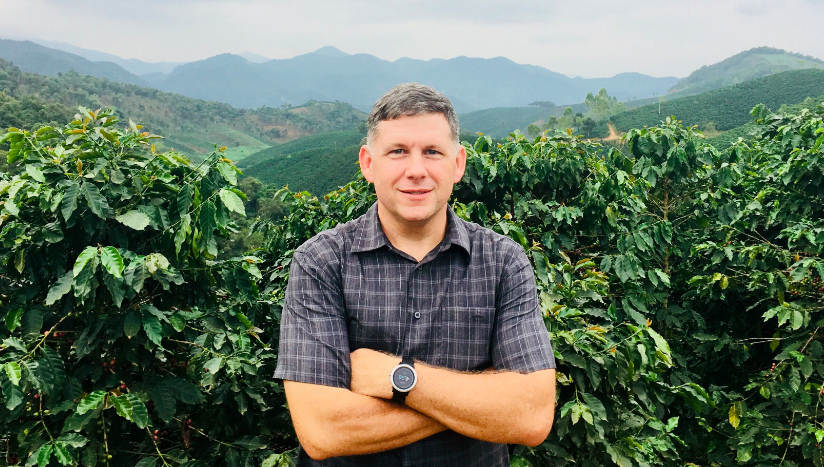 His primary goal of the business is to ensure that his coffee tastes great.
His primary goal of the business is to ensure that his coffee tastes great.
“There are a lot of ‘do-good’ coffees out there, but some of them don’t taste very good,” Dale says. “I want people to buy our coffee because it tastes great and then it’s gravy to know that this is supporting some of the most disadvantaged people in the world.”
Dale sells eight different coffees, all of them single origins except for their blend which is an espresso blend — a medium roast. He notes that a common coffee myth exists that says an espresso roast needs to be really dark.
“That’s only true if the coffee is bad, but if you have good beans, you don’t have to roast them so dark, even for an espresso,” Dale says. “People are surprised when they see that our espresso blend is not dark roasted, but that’s probably our most popular one.”
So far the biggest reward to running Kingdom Bean Coffee is chatting with his customers and sharing the story of how they use coffee to serve people.
“People get excited about coffee,” he says. “I think it connects to the romantic tendencies in people because it’s a naturally interesting subject,” says Dale, who is pleased by the doors his business has opened to the community.
“I’ve met 10 times as many people in the last year in Louisville since we opened than I did the first two years living here,” Dale says. “That’s been super rewarding.”
And if you’re wondering, yes, Dale is now a coffee drinker.
“I started in 2006 by pumping it up with a ton of milk and chocolate syrup, but now I drink it black,” he says.
Kingdom Bean Coffee is located at 11700 Commonwealth Dr, Suite 100, Louisville, Kentucky. For more information or to place an order, visit kingdombeancoffee.com.


